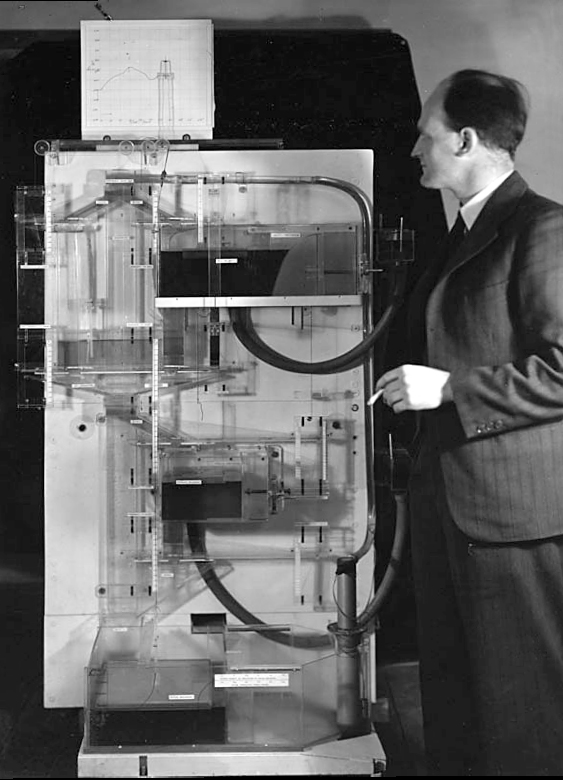Hydraulic Macroeconomics on:
[Wikipedia]
[Google]
[Amazon]
 Hydraulic macroeconomics is an informal characterization of certain types of macroeconomic study assuming aggregate social wealth (demand or supply) as somewhat
Hydraulic macroeconomics is an informal characterization of certain types of macroeconomic study assuming aggregate social wealth (demand or supply) as somewhat
 Hydraulic macroeconomics is an informal characterization of certain types of macroeconomic study assuming aggregate social wealth (demand or supply) as somewhat
Hydraulic macroeconomics is an informal characterization of certain types of macroeconomic study assuming aggregate social wealth (demand or supply) as somewhat smooth
Smooth may refer to:
Mathematics
* Smooth function, a function that is infinitely differentiable; used in calculus and topology
* Smooth manifold, a differentiable manifold for which all the transition maps are smooth functions
* Smooth algebraic ...
, constant and homogeneous
Homogeneity and heterogeneity are concepts often used in the sciences and statistics relating to the uniformity of a substance or organism. A material or image that is homogeneous is uniform in composition or character (i.e. color, shape, siz ...
. The term was first introduced as hydraulic Keynesianism by Alan Coddington in classification of theoretical research methodologies in Keynesian economics
Keynesian economics ( ; sometimes Keynesianism, named after British economist John Maynard Keynes) are the various macroeconomic theories and models of how aggregate demand (total spending in the economy) strongly influences economic output an ...
.
Hydraulics
Hydraulics (from Greek: Υδραυλική) is a technology and applied science using engineering, chemistry, and other sciences involving the mechanical properties and use of liquids. At a very basic level, hydraulics is the liquid counter ...
is the science and engineering of the mechanical properties of liquids. Macroeconomics
Macroeconomics (from the Greek prefix ''makro-'' meaning "large" + ''economics'') is a branch of economics dealing with performance, structure, behavior, and decision-making of an economy as a whole.
For example, using interest rates, taxes, and ...
is the study of the performance and structure of an entire economy. Hydraulic macroeconomics is, essentially, a study of the economy that treats money as a form of liquid that circulates through the economic plumbing.
William Phillips William Phillips may refer to:
Entertainment
* William Phillips (editor) (1907–2002), American editor and co-founder of ''Partisan Review''
* William T. Phillips (1863–1937), American author
* William Phillips (director), Canadian film-maker ...
, a famous economist and creator of the Phillips curve
The Phillips curve is an economic model, named after William Phillips hypothesizing a correlation between reduction in unemployment and increased rates of wage rises within an economy. While Phillips himself did not state a linked relationship ...
, invented the MONIAC
The MONIAC (Monetary National Income Analogue Computer), also known as the Phillips Hydraulic Computer and the Financephalograph, was created in 1949 by the New Zealand economist Bill Phillips to model the national economic processes of the Uni ...
, a hydraulic computer which simulated the British economy. This is the inspiration for the term. Even earlier, in 1891, Irving Fisher
Irving Fisher (February 27, 1867 – April 29, 1947) was an American economist, statistician, inventor, eugenicist and progressive social campaigner. He was one of the earliest American neoclassical economists, though his later work on debt def ...
built a hydraulic machine for calculating equilibrium prices.
Initially, the phrase, "hydraulic macroeconomics", was associated with Keynesian economic models
In economics, a model is a theoretical construct representing economic processes by a set of variables and a set of logical and/or quantitative relationships between them. The economic model is a simplified, often mathematical, framework desig ...
that did not display household or firm optimization.
References
Business cycle Keynesian_economics {{Econ-theory-stub